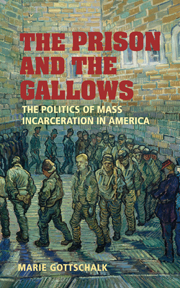Book contents
- Frontmatter
- Contents
- List of Figures and Table
- Preface and Acknowledgments
- 1 The Prison and the Gallows: The Construction of the Carceral State in America
- 2 Law, Order, and Alternative Explanations
- 3 Unlocking the Past: The Nationalization and Politicization of Law and Order
- 4 The Carceral State and the Welfare State: The Comparative Politics of Victims
- 5 Not the Usual Suspects: Feminists, Women's Groups, and the Anti-Rape Movement
- 6 The Battered-Women's Movement and the Development of Penal Policy
- 7 From Rights to Revolution: Prison Activism and the Carceral State
- 8 Capital Punishment, the Courts, and the Early Origins of the Carceral State, 1920s–1960s
- 9 The Power to Punish and Execute: The Political Development of Capital Punishment, 1972 to Today
- 10 Conclusion: Whither the Carceral State?
- Notes
- Select Bibliography
- Index
- Titles in the Series
4 - The Carceral State and the Welfare State: The Comparative Politics of Victims
Published online by Cambridge University Press: 05 September 2012
- Frontmatter
- Contents
- List of Figures and Table
- Preface and Acknowledgments
- 1 The Prison and the Gallows: The Construction of the Carceral State in America
- 2 Law, Order, and Alternative Explanations
- 3 Unlocking the Past: The Nationalization and Politicization of Law and Order
- 4 The Carceral State and the Welfare State: The Comparative Politics of Victims
- 5 Not the Usual Suspects: Feminists, Women's Groups, and the Anti-Rape Movement
- 6 The Battered-Women's Movement and the Development of Penal Policy
- 7 From Rights to Revolution: Prison Activism and the Carceral State
- 8 Capital Punishment, the Courts, and the Early Origins of the Carceral State, 1920s–1960s
- 9 The Power to Punish and Execute: The Political Development of Capital Punishment, 1972 to Today
- 10 Conclusion: Whither the Carceral State?
- Notes
- Select Bibliography
- Index
- Titles in the Series
Summary
“Revenge is a kind of wild justice, which the more men's nature runs to, the more ought law to weed it out.”
– Francis BaconThe united states gave birth to a formidable victims' movement in the 1970s that was highly retributive and punitive. Victims became a powerful weapon in the arsenal of proponents of the law-and-order agenda. In a way not seen in other Western countries, penal conservatives successfully framed the issue as a zero-sum game that pitted the rights of victims against the rights of offenders. This contributed significantly to a hardening of the penal climate against those who break the law. Whereas a concern for victims initially emerged in the 1950s and early 1960s out of progressive impulses in the United States and other countries, conservative impulses were clearly ascendant in the U.S. case by the late 1970s.
The dominant ideological current running through the U.S. victims' movement was retributive and focused on criminal justice concerns. Its guiding principles included a strong belief that offenders should be punished based on how much punishment they inflict on society and on individual victims; that victims should be given more power in decisions about prosecution and sentencing; and that the criminal justice system exists largely to satisfy the victim's “desire for justice, moral vindication or revenge.” This retributive criminal justice view of what victims deserve established such a tenacious hold in the United States by the 1980s that it is easy to overlook alternative perspectives that initially helped to spur an interest in the plight of victims in the United States and that continued to predominate in other countries.
- Type
- Chapter
- Information
- The Prison and the GallowsThe Politics of Mass Incarceration in America, pp. 77 - 114Publisher: Cambridge University PressPrint publication year: 2006



